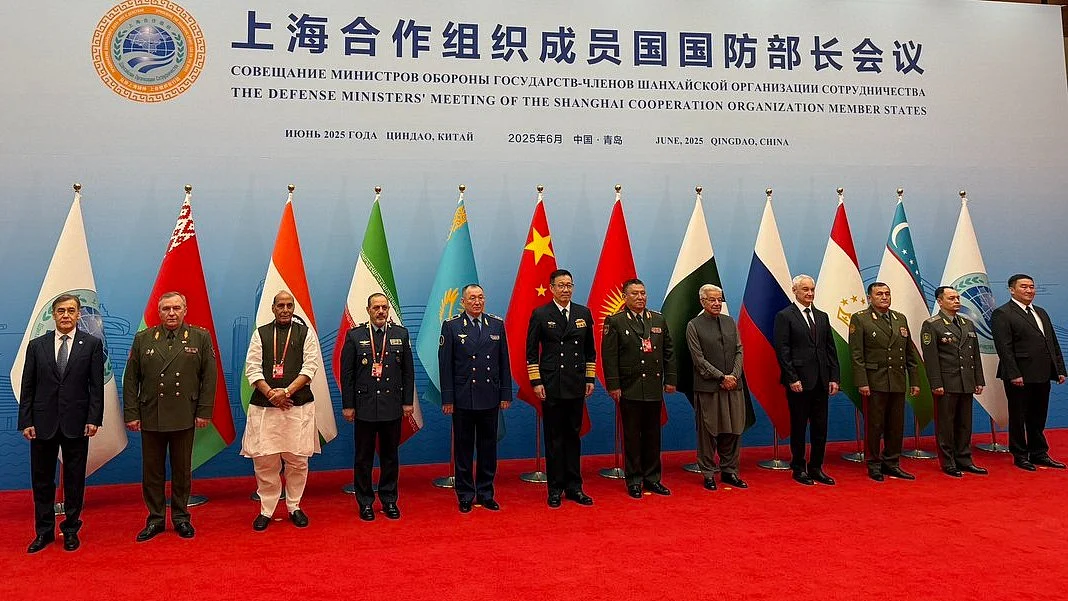Did the SCO endorse Pakistan’s stand on Balochistan?
India finds itself diplomatically isolated, with Russia, China and Iran among those ignoring our position on the Pahalgam terror attack and leaving it out of the joint statement

No joint statement was issued at the recently concluded Shanghai Cooperation Organisation (SCO) Defence Ministers’ Meeting in Qingdao, China.
Since the SCO issues only unanimous statements, the draft statement was dropped after India refused to sign it. The debate in India since then, late evening of 26 June, Thursday, has been whether it was a diplomatic victory for India or international isolation — did we ‘walk the talk’ and walk out with our head held high, or was India cold-shouldered by the other members?
Defence minister Rajnath Singh, who led the Indian delegation, claimed to have stood firm on cross-border terrorism and the SCO’s perceived double standards. The draft joint statement which he refused to sign, reports suggest, mentioned terrorist activities in Pakistan’s Balochistan province, but was silent on the Pahalgam terror attack of 22 April 2025. This was unacceptable to India.
It was undoubtedly a diplomatic setback, because the draft statement apparently ignored India’s stand on cross-border terrorism. Instead, the draft spoke of militant activities in Balochistan and, according to reliable but not officially confirmed information, referred to India’s support of the separatist movement in Balochistan.
India has, of course, denied any involvement; but clearly failed to convince other members of the SCO — a group that was set up in 2001 and includes China, Russia, Pakistan and several central Asian countries.
It is easy to see why India’s denial cut no ice, really.
India’s national security advisor since 2014 Ajit Kumar Doval is on record for having warned Pakistan that if it did not stop sponsoring cross-border terrorism in India, it would lose Balochistan, where the Balochistan Liberation Army (BLA) has been waging a ‘war of liberation’.
The arrest of a former commander in the Indian Navy, Kulbhushan Jadhav, from Balochistan in 2016 on charges of spying is also cited by Pakistan as proof of involvement of India’s external intel agency RAW (Research & Analysis Wing). Jadhav was tried by a military court in Pakistan and was sentenced to death in 2017. While the same year the International Court of Justice (ICJ) had stayed his execution, his current fate is not clear.
Pakistan also accused India of complicity in the BLA’s hijacking of the Jaffar Express passenger train in March 2025.
India’s failure to convince members of the SCO to include the Pahalgam terror attack in the draft is telling. While other members have maintained a stiff upper lip, even the Indian delegation has offered no explanation why India’s demand was not met and on what grounds.
Meanwhile, a statement purportedly issued by the ‘Republic of Balochistan’ thanking the Indian defence minister for his principled stand at the SCO has also embarrassed India — despite the authenticity of the statement being doubtful. The BLA in statements from time to time has expressed its gratitude to India for the unspecified support we have purportedly extended.
The diplomatic debacle at the SCO has divided opinion back home too. Former external affairs minister Yashwant Sinha tweeted on X, ‘India stands completely isolated at the global stage. The SCO communique is the latest example where the terror attack at Pahalgam has been ignored and Baluchistan has been mentioned. The prime minister has failed completely and must resign.’
Meanwhile, a defence and strategic analyst and a distinguished fellow at the Observer Research Foundation (ORF), Manoj Joshi told India Today TV, “Terrorism is an important element of the SCO charter and therefore to not include Pahalgam was a travesty.”
India’s case on Pahalgam was also weakened by disclosures this week, reported in the Indian Express, by the National Investigating Agency (NIA), that the pencil sketches of the suspected terrorists at Pahalgam released by the government were of other people — not involved in the terror attack.
To add to India’s isolation at the SCO, it is now known that no all-party delegation — part of India’s global outreach after Operation Sindoor — was sent to any of the SCO member countries.
“Who decided not to send any ‘outreach team’ to any of the SCO nations after the Pahalgam outrage?” wondered an Indian netizen.
Follow us on: Facebook, Twitter, Google News, Instagram
Join our official telegram channel (@nationalherald) and stay updated with the latest headlines
